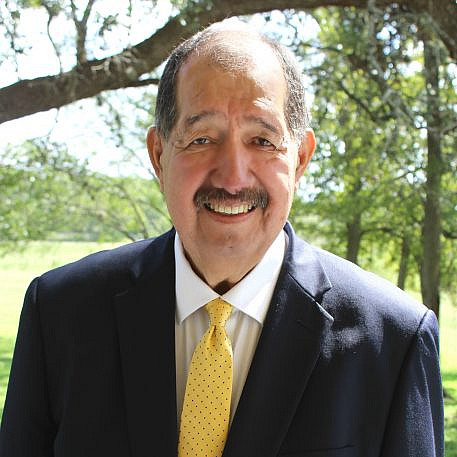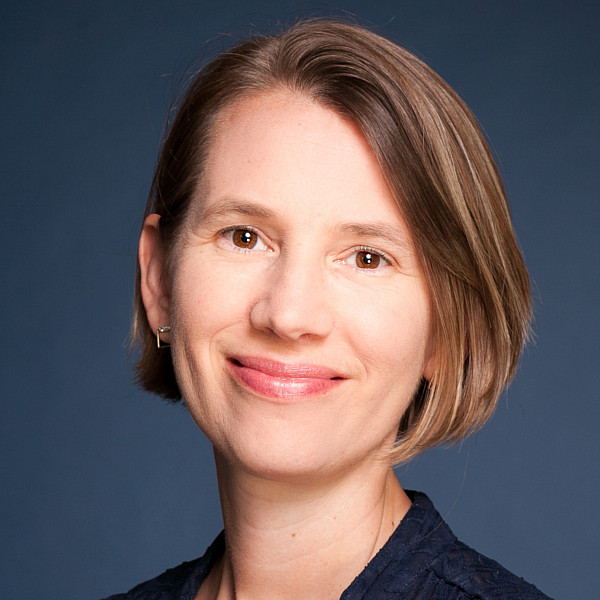News
Mission: Possible
February 07, 2019
February 07, 2019
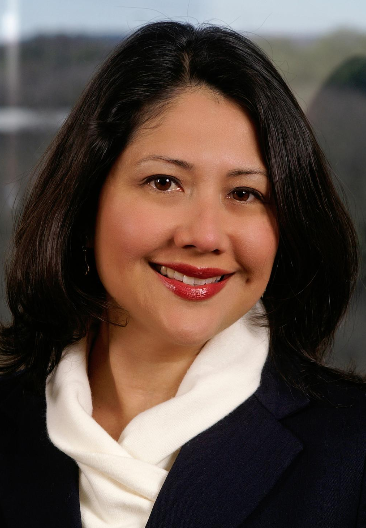
Vásquez is indeed “a big deal,” but she’s also as delightful in person as Selbin describes—her smile and body language emanate warmth and openness. Since January 2018, she has served as the chief executive officer (CEO) of Mission Capital, an Austin-based philanthropic consulting group that helps train and guide nonprofits, startups, and individuals in addressing inequity at the root of social issues such as poverty, healthcare, crime, and housing affordability. “This is really a dream job for me because, personally and professionally, it ties together lots of my previous lives,” says Vásquez. Those lives include growing up in South Texas in a predominantly Latino community; having studied international relations, with a focus on Latin America, at Southwestern; and being a community developer at heart. “I really believe in the power of healthy, vibrant communities,” the Southwestern alumna says, “but that takes access to the basics of education, healthcare, housing—and it takes community-based leaders who care about their communities and engage in different ways. I feel like I get to do all of that here.”
From Robstown to Georgetown
Vásquez’s commitment to community—or rather to a multiplicity of communities, as Selbin comments—began when she was quite young. The grandchild and child of farmworkers, Vazquez grew up in the small town of Robstown, Texas (current population 11,657), a suburb west of Corpus Christi. She was the youngest of four siblings, who comprised the first generation of college students in her family. “I was fortunate that my two older brothers and older sister paved a way for me to consider college as the next option, which I believe is a tool for really breaking the cycle of generational poverty,” she says. “I felt like I was part of that first rung of pioneers in our family.”
She chose Southwestern University in Georgetown because her cousin and a high-school classmate had both participated in the Lorenzo de Zavala (LDZ) Youth Legislative Session on campus—a leadership program for high-school sophomores hosted by the National Hispanic Institute, founded by Southwestern alumnus Ernesto Nieto ’64. Their experiences encouraged Vásquez to apply, and the University helped seal her decision when she earned a highly competitive, nearly full-ride Presidential Scholarship—one of only four awarded that year. “I really liked the institution,” she recalls. “Coming from a small town, it was a small campus, and that gave me a sense of familiarity and comfort. And I also knew it had a great reputation in Texas and just regionally, so I chose to go.”
Coming from a small town, it was a small campus, and that gave me a sense of familiarity and comfort. And I also knew it had a great reputation in Texas and just regionally, so I chose to go.
Attending Southwestern helped Vásquez expand her perspective. She had arrived in Georgetown with the help of her wonderfully strong family, and she was grateful for their support as well as the “tremendous gift” of her scholarship from the University. But going to a private university as a first-generation college student would only help cement what Vásquez had begun to recognize throughout her childhood and teen years: that there were serious economic and educational disparities within her hometown and college communities. As she recalls, those inequalities “really became apparent moreso when I left my community and I saw the way other people lived in the world and how it was so different from my upbringing and my own economic background.” That expanded awareness would ultimately influence Vásquez’s academic, extracurricular, and professional interests.
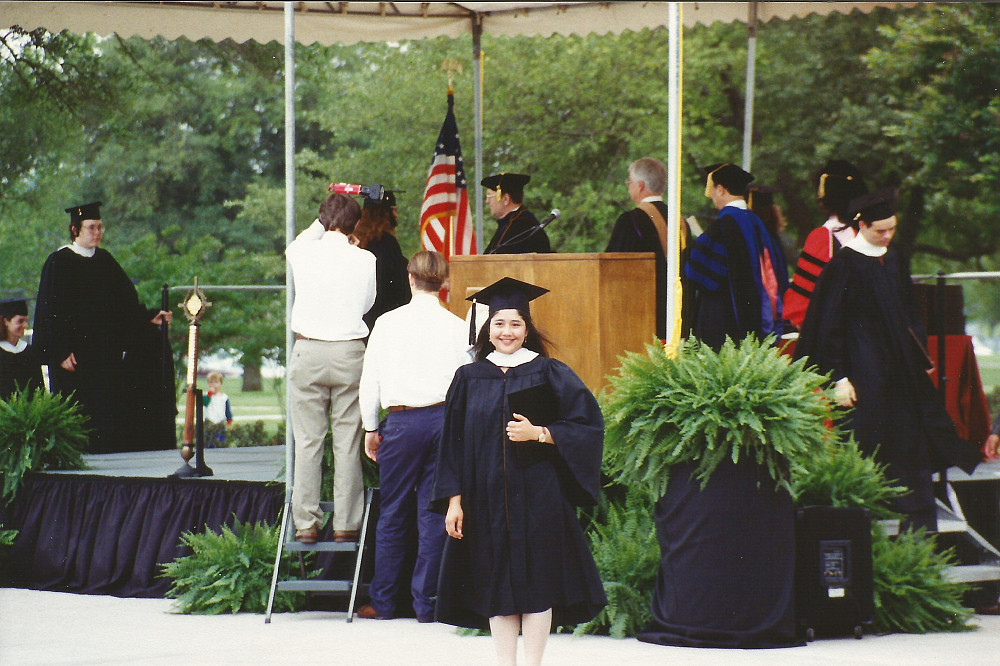
Building community at Southwestern
Of her time at the University, Vásquez’s favorite memories are of “everything: the courses, the curriculum, my professors. Oh my gosh, I loved my professors so much—and my fellow students who came from all parts of Texas and across the country and who were fellow learners with me.” In particular, she holds dear the wonderful group of eight women she met during her freshman year who lived on the same floor of “LK,” or the Laura Kuykendall Residence Hall, whom she is still good friends with today and who reunite every few years. She was also active in SU’s Hispanic Student Association as well as the International Club, a group whose diverse membership included international students and students of color who were interested in discussing international affairs.
Possessing a deep interest in theology and how elements of spirituality are expressed in people’s personal lives but also their professions, Vásquez took several elective courses in religion. But some of her favorite classes were those that concerned women’s issues and the world of international development. Several of those courses were with Selbin, who was still a new professor when Vásquez was in her first years at the University. He recollects warmly, “She just had this bright, shiny face, and she was so interested in so many things. She was part of that exceptional group of students who were training me more than I was teaching them. Madge was this strong but quiet type who always had really smart, insightful things about whatever we read or what we were talking about. She was someone that other students looked to; whenever we discussed a hard or tricky question, they’d turn to her. It was really clear to me that she was special—even among the set of them who spoiled me. It was amazing.”
I think what’s beautiful about a liberal arts education is that, at least for me, it created the ability to be well-read and well-versed in different topics, [but also] it just nurtured a curiosity, a love of learning, not only of academic material but of the humanities, of people, and of how our world is big.
Vásquez laughs delightedly but modestly when she hears such praise. “All of that prepared me. I think what’s beautiful about a liberal arts education is that, at least for me, it created the ability to be well-read and well-versed in different topics, [but also] it just nurtured a curiosity, a love of learning, not only of academic material but of the humanities, of people, and of how our world is big.”
From the local to the global community
That global perspective was enhanced by Vásquez’s extracurricular service as a youth representative on the international board of a global ministries program of the Disciples of Christ and the United Church of Christ. The organization had offices in the Middle East, Africa, Latin America, Europe, and Asia, and Vásquez was invited to join during an extraordinary period in international relations—on the heels of apartheid ending in South Africa in 1994 and after the Central American Peace Accords had been signed in 1992. She was particularly moved by work being done by female revolutionaries and women’s organizations in El Salvador, a country that for decades before the peace treaty had been ravaged by military dictatorships and civil war. “In my congregation at home in our small town, we were talking about what was happening just south of the border, which was right in our backyard. I just felt the power of proximity,” Vásquez recalls. “And as a woman of color and a Latina myself, even though I’m a fifth-generation Texan, I just felt an affinity with that community.”
So while considering the world’s needs through her board service experience, Vásquez became intrigued by the Fulbright U.S. Student Program, a cultural-exchange opportunity that would enable her to further her research abroad after graduation. As it is for many first-generation college students, the Fulbright was not a scholarship Vásquez had grown up knowing about, so she attended an information session at Southwestern to learn more about the requirements for the highly competitive application process.
Around that same time, SU’s Catholic Students Association hosted a group called Pax Christi, and their guest speaker was an ex-priest from El Salvador who lived in Round Rock and had founded a nonprofit organization in his native country that was helping to create microenterprises for people trying to rebuild a civil democracy and economic stability after the Peace Accords had been signed. Needing a host country, Vásquez reached out to the nonprofit founder, who immediately agreed to sponsor her. “Through both of those connections made through Southwestern, I was able to get this huge gift [of the] Fulbright Fellowship, which allowed me right after graduating to move to San Salvador [the capital of El Salvador]. I lived there for a year working with different women’s organizations and NGOs as they were rebuilding the country, and I did some research studying theology at the UCA [the University of Central America]. It was such a huge learning opportunity for me that really helped to inform my education and my professional interests.”
Developing community—and personal—resilience
After her field work and research on international development, healthcare, and civil democracy in El Salvador, Vásquez moved to Washington, D.C., to work with
Equity Research Corporation, a faith-based Latino nonprofit whose mission was to create community health programs. She then moved back to Austin to take a position with the National Center for Farmworker Health. “For me, it was like coming full circle because my grandparents had been farm workers and my parents did farm work,” she reflects. “Working as program staff, where I was seeing that things were not changing as rapidly, I realized that it was policy that was really the tool. You had to legislate change.” And that’s what encouraged her to apply to and attend the LBJ School of Public Policy at the University of Texas, where she earned her master’s in public policy and public administration. Her graduate coursework and research help inform her work today at Mission Capital: “We’re the wind beneath the wings of the social sector and nonprofits, so we’re exploring how we help our nonprofits to help influence systems change in addition to providing direct services.”
After UT, Vásquez brought her knowledge of, firsthand experience with, and passion for community development to PeopleFund, a local community development financial institution (CDFI) whose mission was to provide capital to mostly women in minority-owned businesses. She then went to work for Wachovia Bank, where she helped assure that the bank was investing in low-to moderate-income areas, either by opening branches and providing business and mortgage loans in traditionally marginalized communities or by contributing philanthropic dollars to those communities. Vásquez says that she learned so much from those positions and continues to use those experiences and the relationships she built in her role at Mission Capital today. “That was one form of developing the community: through entrepreneurship or businesses who were serving the community by supplying goods and services but also building wealth and assets for their own families,” she says.
If you look at Vásquez’s remarkable CV, you’ll likely be surprised to see that what followed her work at Wachovia was her role as director of dental operations at St. David’s Foundation. She laughs when I jokingly ask whether she somehow managed to incorporate a stint in dental school amid her myriad activities. “No, but this is the benefit of the liberal arts education that allows you to be adaptive and innovative!” she giggles. She explains that when the banking crisis occurred in 2009, she and her colleagues were forced to look for new jobs. A friend referred her to St. David’s Foundation, a philanthropic wing of one of the largest healthcare systems in Texas. The organization was running a free mobile dental program for children, and Vásquez was hired to manage the business aspects of the program because she had developed transferrable skills in finance and business through her community development work at PeopleFund. She assures me that a dentist served as the clinical director. “Together, we scaled that program and grew it threefold,” she says proudly.
It’s through that risk-taking and through failure that innovation is found.
So she may not have studied how to fill cavities or pull teeth, but Vásquez was still mastering new lessons: “One thing that I’ve learned—and I continue to learn every day—is the importance of risk-taking and to really just be comfortable with discomfort sometimes. Because it’s through that risk-taking and through failure that innovation is found, and we don’t know unless we try it.” She says that especially if you’re a high achiever, this can be challenging because success is often the goal, and success can be rather narrowly defined. Instead, she says, success can be measured by one’s creativity and ability to adjust to unexpected circumstances. It’s a discussion she has often had at Mission Capital, too: “How do we create resiliency for leaders, for their board members, for communities? It’s so important.”
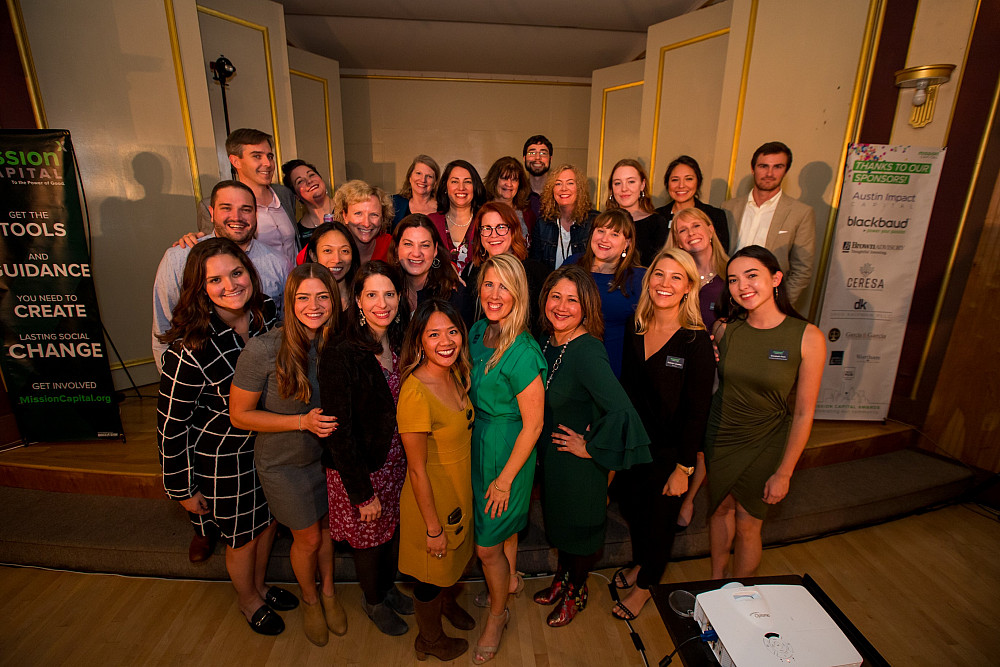
The dream job
As CEO of Mission Capital, Vásquez leads a nonprofit consulting firm that she describes as a “capacity builder” whose purpose is “to harness the best of human capital, financial capital, and social capital to the greater good of the community.” It’s clear that her years at Southwestern still influence her work: “We provide business and strategic planning and financial modeling and support. We equip and connect nonprofit leaders through learning opportunities for staff, for executives, for board members. We’re very much a learning organization, which is something I love because I’m a lifelong learner.”
Having served as a funder for the last 15 years, Vásquez has found being on the other side as a fundraiser humbling and illuminating, but she revels in being able to bring people together to understand the community’s real needs and work toward shared goals. “I think for me, what I love about it is the ability to connect people, leaders, resources, funders,” she says. And while some may not have a clear idea of what a CEO does exactly, Vásquez is enthusiastic about mentorship and vision being the core of her work. “I really do believe the job of a CEO is to support and nurture leaders, and I do that with my fellow team, my colleagues,” she remarks. “It takes a love of that business operations side, which I have, and, I think, a commitment to mission—so just clarity of what our unique value proposition is in this community, which is to serve the social sector and multiply its impact.”
Because she does serve as a leader for both her organization and the Austin community, Vásquez has been reflecting a lot on the mentors she’s had throughout her career, and it’s clear that she still values empathy and education as crucial. “I try to emulate those characteristics that have been most meaningful for me,” she says, “and I think those include deep listening, a sense of courage, and humility—that’s so important. And that goes back to always approaching things with a spirit of curiosity and learning.”
Deep listening allows Vásquez and her colleagues to hear and heed the voices of their constituents and clients, truly understanding the people they serve and adapting to their needs based on the feedback they provide. So for students and young professionals hoping to similarly explore community development, international relations, or both, Vásquez advises seeking opportunities in which they “can authentically engage with communities at a grassroots level, whether it’s through neighborhood community organizations or other nonprofits.”
She also believes that students in any field would benefit from keeping an open mind when it comes to pursuing those opportunities, whether they be academic, extracurricular, or professional experiences. “For me, what’s been just a great tool—and it was serendipity really—is just an openness and receptivity to lots of different paths,” she says. “Even when [I was] in school, there was this notion of, ‘OK, you choose your degree plan, and then you stay in this field.’ Well, for whatever reason, I butterflied across lots of different fields, which kind of felt a little scattershot when I was doing that. But now, sitting where I am, it feels like it totally makes sense, and I draw from all of those experiences and those relationships and connections daily in my current work.” She hopes that members of her many communities can take heart from knowing that “everything is connected. Be fearless in terms of following different paths and then writing your own story.”
It’s words of encouragement like that that confirm precisely how Selbin describes her: “She has a quiet intensity to her. But she’s just so gracious and so affable.”
















